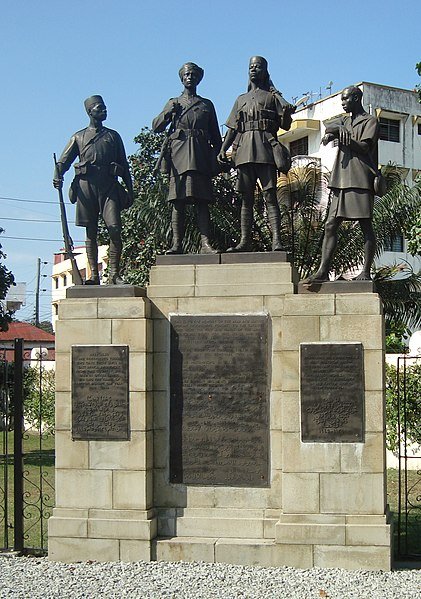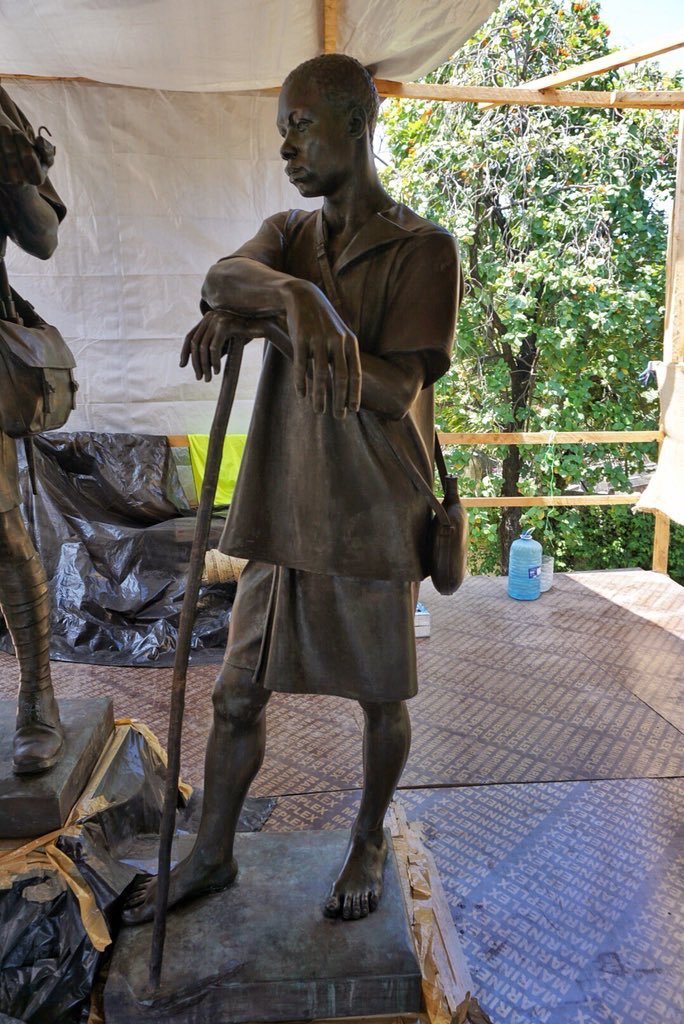In documenting the unsung African efforts in the East African Campaign of World War 1, of which Taveta saw a considerable amount of action, we must begin with the Carrier Corps. Pictured: The Askari Monument in Mombasa (there are others in Nairobi and Dar es Salaam), with a lone figure representing a porter, part of the Carrier Corps, a military labour unit supporting the British campaign against German forces in the East African Campaign of World War 1. They carried ammunition, supplies and wounded troops.


The British initially used draught animals for transportation of ammunition and supplies but a Tsetse fly outbreak affected the animals resulting in a switch in logistical strategy, opting for human labour. Over 400,000 men were recruited as porters in the Carrier Corps. The porters were recruited from across Kenya (many from the interior), Uganda, Tanzania, Malawi, Zambia, Congo and Mozambique. Of these, about 163,000 were Kenyan Africans. The recruitment was mainly through a quota system that African chiefs had to meet and forced conscription. While World War 2 had many Africans volunteering to serve (mainly for the allure of seeing the outside world), the E. African Campaign of World War 1 represented no particular incentive, thus the forced conscription. The only thing setting it apart from slavery were wages. The wages themselves were a paltry amount. The Native Followers Recruitment Ordinance established the Carrier Corps wages at 5 Rupees a month, rising to 6 Rupees after 3 months of service. In comparison, a Mombasa dockworker at the time received 30 Rupees a month. The working and living conditions for the Carrier Corps were not any better. They walked barefoot on the rough terrain, carried heavy loads and were not provided with enough beds, medical supplies and vaccinations. This led to a high mortality rate among this unit, combat-unrelated.
The final death toll for the Carrier Corps is estimated at over 95,000…of which almost 26,000 were Kenyan Africans. A further 13,748 Kenyan Africans were listed as missing in action. The 95,000 no. is almost double that of Canadian, Australian and Indian troops who died in the war. “The displacement during the war of these people (Carrier Corps) is one of the least studied aspects of the war but one that arguably affected more lives than the actual combat in Africa during the war”, Mahon Murphy in International Encyclopedia of the First World War. To fully appreciate what the displacement meant for some communities, Willie Mwadilo, a tour guide and researcher on the East African Campaign of World War 1 estimates that 75% of adult males around Voi region were involved in some military activity during the war. Most as porters.
Their significant contribution in the war is easily forgotten, with no individual names on any memorial plaques. The Carrier Corp’s legacy only lives on in the Askari Monument and the names ‘Kariakor’ in Nairobi and ‘Kariakoo’ in Dar es Salaam, what were their housing quarters. The inscription on the Askari Monument reads, “This is to the memory of the Arab and Native African Troops who fought, to the carriers who were the feet & hands of the army and to all the other men who served and died for their King and country. If you fight for your country even if you die your sons will remember your name.” Comforting words for ones that didn’t ask to be part of the war and one that took more from them than it gave back. We remember the Carrier Corps, unsung heroes of World War 1 East African Campaign.
Article made possible by ‘International Encyclopedia of the 1st World War’-Mahon Murphy, ‘Kariakor-The Carrier Corps’-G. Hodges, ‘A Look Inside the 1st World War’-Alison Metcalfe, ‘Carrier Corps Recruitment in the British E. African Protectorate’-Donald C. Savage, J. Forbes Munro.
SUPPORT: We are a non-funded entity kept alive solely by our readers’ thirst for the undocumented and not adequately documented aspects of our past. The logistics of getting these stories can sometimes be a challenge. We would appreciate your support. To support Pwani Tribune’s history and culture research plus content creation…M-PESA till number: 8627478 Contact: +254726860693


